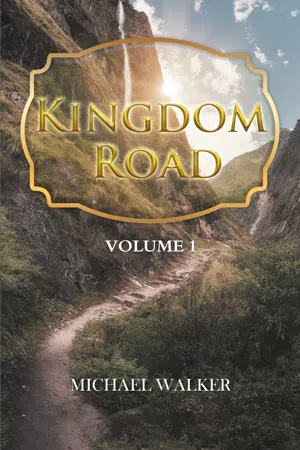
- 140 pages
- English
- ePUB (mobile friendly)
- Available on iOS & Android
Kingdom Road - Volume 1
About this book
In the year AD 1492, North American was already a populated wilderness, abundant in natural resources sought by foreign conquerors. They were known as explorers. Wealthy societies were already developed by educated Indian tribes with knowledge of navigation, weather patterns, and astronomical cycles.One of the most exciting explorers (Christopher Columbus) was a man that attributed his motivation to God and wrote about it in the Book of Prophecy. Secular historians distorted or deleted many of the astonishing insights disclosed in his journals. Kingdom Road Volume 1 unlocks the mystery of ancient maps used by Christopher Columbus to reach the shores of North America. His journey may have been an effort to rediscover long lost treasures collected by King Solomon.Spreading the kernels of rebellion, Christopher Columbus and a small band of travelers known as Conquistadors triggered an all-out rebellion that erupts across the world and the continent of North America. During the search for treasures, this book reveals an untold story of wars that raged across the continents, between indigenous tribes and an ancient race of beings called "giants" or "Nephilim."
Tools to learn more effectively

Saving Books

Keyword Search

Annotating Text

Listen to it instead
Information
- He tithed 1/10 of his earnings to help poor girls.
- He left money to a Jewish man that lived at the entrance of a Jewish community.
- Columbus left monetary funding to support a crusade; he hoped others would use to liberate Jerusalem.
Table of contents
- Preface
- Introduction
- Another DNA
- The Power of Prophecy
- The Third Temple of God
- A Fruit of the Holy Spirit
- The Manifestation of the Holy Spirit
- The Seven Spirits of God
- Doctrine of Discovery
- Our Comforter
- About the Author
Frequently asked questions
- Essential is ideal for learners and professionals who enjoy exploring a wide range of subjects. Access the Essential Library with 800,000+ trusted titles and best-sellers across business, personal growth, and the humanities. Includes unlimited reading time and Standard Read Aloud voice.
- Complete: Perfect for advanced learners and researchers needing full, unrestricted access. Unlock 1.4M+ books across hundreds of subjects, including academic and specialized titles. The Complete Plan also includes advanced features like Premium Read Aloud and Research Assistant.
Please note we cannot support devices running on iOS 13 and Android 7 or earlier. Learn more about using the app